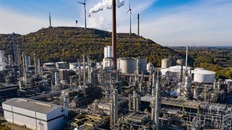- Five plants at Horst and Scholven will shut down by 2025, reducing crude oil capacity from 12 million to 8 million tonnes annually.
- The transformation aims to cut operational CO2 emissions by up to 500,000 tonnes per year from 2026.
- The site will enable lower-emission fuel production, including Sustainable Aviation Fuels, through co-processing in the hydrocracker plant.
- A circular economy network for petrochemical plants may be established with a partner, pending approvals.

Transformation Plan
bp is planning a major transformation at its Gelsenkirchen refinery to prepare for the energy transition. The site will reduce complexity, shut down parts of the plant, and convert existing facilities to process biogenic materials alongside conventional ones. This transformation aims to make the refinery future-proof and more competitive.
Operational Changes
High plant complexity, structurally high costs, and declining demand for conventional fuels necessitate these changes. Five plants at the Horst and Scholven sites are scheduled to shut down by 2025, reducing the total crude oil processing capacity from 12 million to 8 million tonnes annually. These measures could cut the site's operational CO2 emissions by up to 500,000 tonnes per year from 2026.
Lower-Emission Fuels
The refinery will focus on producing lower-emission fuels, including Sustainable Aviation Fuels (SAF), through co-processing in the hydrocracker plant at the Gelsenkirchen-Scholven site. This shift aligns with the increasing demand for more sustainable fuel options.
Future Prospects
There is potential to establish a circular economy network for the refinery's petrochemical plants in collaboration with a partner, pending necessary approvals. The Gelsenkirchen City Council has already adapted the development plan to support this initiative.
Impact on Workforce
The transformation will also impact the organization of work at the site. While bp aims to retain as many employees as possible, there will be fewer jobs overall in the future refinery. Negotiations with employee representatives will begin to ensure the transition is fair and socially acceptable.

